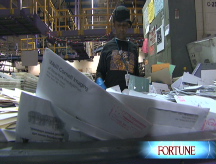The dead mall problem
Experts say Atlanta, Las Vegas, and retail hubs in California and Florida are at real economic risk if thousands of more stores shutter in 2009.
NEW YORK (CNNMoney.com) -- As the recession leaves more retail casualties in its wake, rising store bankruptcies and mall closures could have devastating economic consequences.
As more stores exit malls, vacancies in regional malls could rise past 7% by year-end, a level not hit since the first quarter of 2001, according to real estate research firm Reis.
Major cities across America will be affected, said David Birnbrey, Chairman and co-CEO of Atlanta-based The Shopping Center Group, a retail real estate services firm.
Both Birnbrey and Susan Wachter, professor with University of Pennsylvania's Wharton Real Estate Department, warn the social and economic impact of empty stores can be devastating.
"One of the biggest consequences [of store and mall closings] is the loss of a sense of community," Birnbrey said. "I am a big believer that malls are an essential part of Americana. A mall is a place where people gather and socialize."
In addition, many municipalities are heavily dependent on retailers for the tax revenue and jobs that they generate.
For example, Montgomery County, Pa., gets as much as 50% of its tax revenue from the local King of Prussia mall, said Wachter.
The impact will be felt on local police service, schools and roads, said Birnbrey.
The village of North Randall in Cuyahoga County, Ohio, is on the verge of extinction after a challenging economic and competitive climate has crippled business at the Randall Park Mall.
The shopping center, once the largest enclosed mall in the greater Cleveland area, is closing after 32 years. [Read story]
The pain could be far reaching. "The Midwest, California, Florida, Atlanta and Arizona are very vulnerable to a retail recession," said Wachter.
The International Council of Shopping Centers (ICSC), in its most recent forecast, expects that 6,100 chain stores will shutter this year, the highest level since 2004 "as the U.S. recession continues to take its toll on the retail sector and its job market."
In 2009, the ICSC estimates that store closings could exceed 3,100 in just the first half of the year. However, the number of potential closings rises exponentially when the firm takes into account both public and private sector businesses.
The ICSC projects that about 148,000 retail establishments - both public and private - will go out of business this year and another 73,000 stores will close in the first half of 2009.
The ICSC projects that about 625,000 retail jobs will be eliminated this year "with little change in the pace for early 2009."
Fewer retailers means less competition and fewer places to shop. "Right now everyone is euphoric over the big sales," Birnbrey said. "Once the holiday season is over then we could get this monopolistic situation where the [retail] survivors realize that they don't need to be as competitive on prices."
But not everyone sees a dead mall as a negative development.
"Our country has six times more retail space per capita than any other county," said Ellen Dunham-Jones, director of the architecture program at Georgia Institute of Technology.
"We're just cannibalizing our existing stores by building more stores even when sales aren't increasing," she said. "We were long due for a retail correction and we're going through it now."
Dunham-Jones said big-box enclosed malls have become a dying breed as more shoppers prefer going to shop at strip malls or "lifestyle" open-air malls.
"The good news is that this isn't the first time we'll see dead malls," she said. In an upcoming book, "Reftrofitting Suburbia," co-authored by Dunham Jones, she's included case studies of more than 100 places across North America that have turned dead malls or big-box stores into thriving community centers.
What's needed, she said, is for the public and private sector to be opportunistic and develop the 100 acres of prime mall space for mixed community use like schools, libraries and new housing.
John Norquist, a former mayor of Milwaukee who now lectures on urban planning, agreed with Dunham-Jones.
"There's no disgrace in a dead mall," Norquist said. "In Milwaukee, we had one department store, Boston Store, in the downtown area. When that went away and the rest of retailing went into the suburbs, we focused in developing the empty space into housing and I gave fast permits."
Norquist rationalized that more housing would eventually attract more retailing. "Milwaukee opened up for [retail] business in 2001 and it's continued to grow," he said.
But Wharton's Wachter remained unconvinced. She said any talk of redevelopment in this environment is "unrealistic."
"Everything that has been suggested needs funding. There's no money for these adaptive reuses [of retail space] for communities," she said.
Birnbrey's criticism was somewhat harsher. "It's human nature to put a positive light on a bad situation," he said. "It's just a case of hope springs eternal." ![]()



